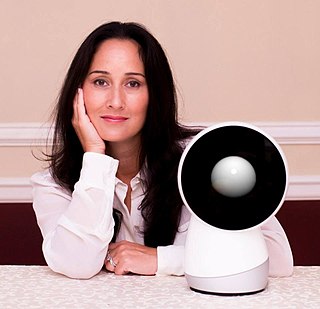A Quote by Bill Budge
You will be able to program a robot to follow a track on the ground and manipulate a hand. You can also write little programs that will give the robots goals.
Related Quotes
You like the Earth, Man, and you - pawing the ground - think of God, the little nursling will recognize you, and will think of you with love, because God lives even in it also. Give nourishment to the developing little creatures, either to plant or to animal, and it will develop for your sweet amazement. Give food for the wild animal starving, and it will slick to you.
Fuzzy logic will produce a computer that will even seem to have a personality. It will seem to have a character. It will be able to talk to you. It will be able to translate from one language to another instantaneously. You will be able to give it instructions. You will be able to tell it stories. If it doesn't understand something, it will ask you.
Robots are important also. If I don my pure-scientist hat, I would say just send robots; I'll stay down here and get the data. But nobody's ever given a parade for a robot. Nobody's ever named a high school after a robot. So when I don my public-educator hat, I have to recognize the elements of exploration that excite people. It's not only the discoveries and the beautiful photos that come down from the heavens; it's the vicarious participation in discovery itself.
A new study says by 2030 household robots will dominate every phase of our lives. The study says the No. 1 field for robot growth is medicine. That makes sense. Robots already perform well in surgery. That is, until there is a power outage. Then it's just a coat rack leaning over you as you bleed to death.
Humans were still not only the cheapest robots around, but also, for many tasks, the only robots that could do the job. They were self-reproducing robots too. They showed up and worked generation after generation; give them 3000 calories a day and a few amenities, a little time off, and a strong jolt of fear, and you could work them at almost anything. Give them some ameliorative drugs and you had a working class, reified and coglike.
I think the American Dream used to be achieving one's goals in your field of choice-and from that all other things would follow. Now, I think the dream has morphed into the pursuit of money: Accumulate enough of it, and the rest will follow. We've become more materialistic. For balance, I think we need to get back to idealism and patriotism, but also be realistic with our monetary goals.
Some people think that, inevitably, every robot that does any task is a bad thing for the human race, because it could be taking a job away. But that isn't necessarily true. You can also think of the robot as making a person more productive and enabling people to do things that are currently economically infeasible. But a person plus a robot or a fleet of robots could do things that would be really useful.
Most programs are not write-once. They are reworked and rewritten again and again in their lived. Bugs must be debugged. Changing requirements and the need for increased functionality mean the program itself may be modified on an ongoing basis. During this process, human beings must be able to read and understand the original code. It is therefore more important by far for humans to be able to understand the program than it is for the computer.

































